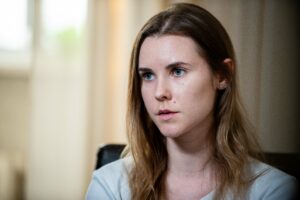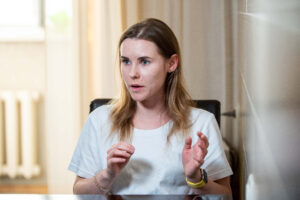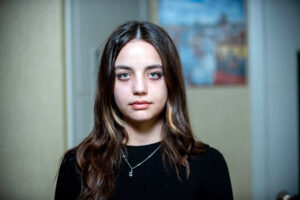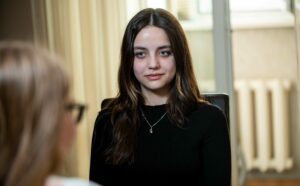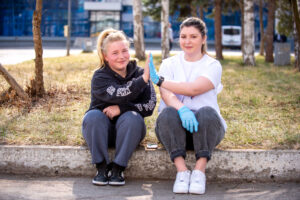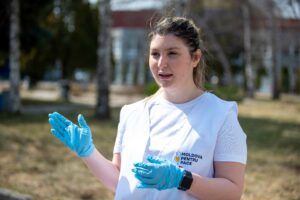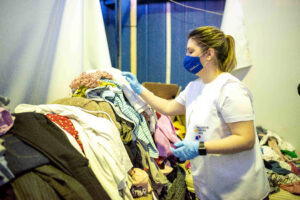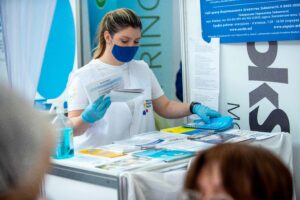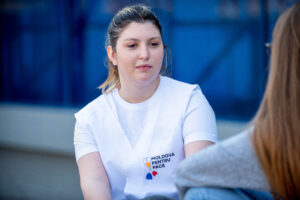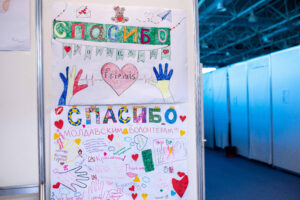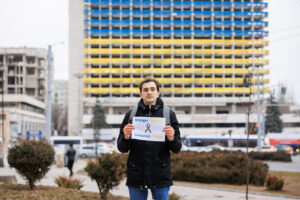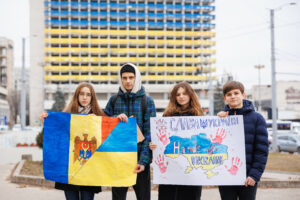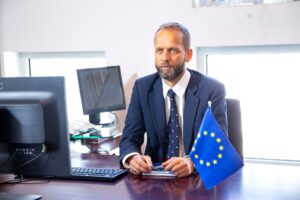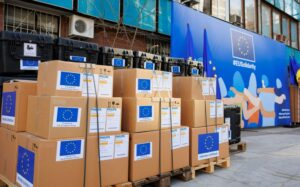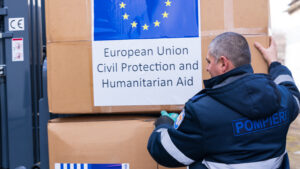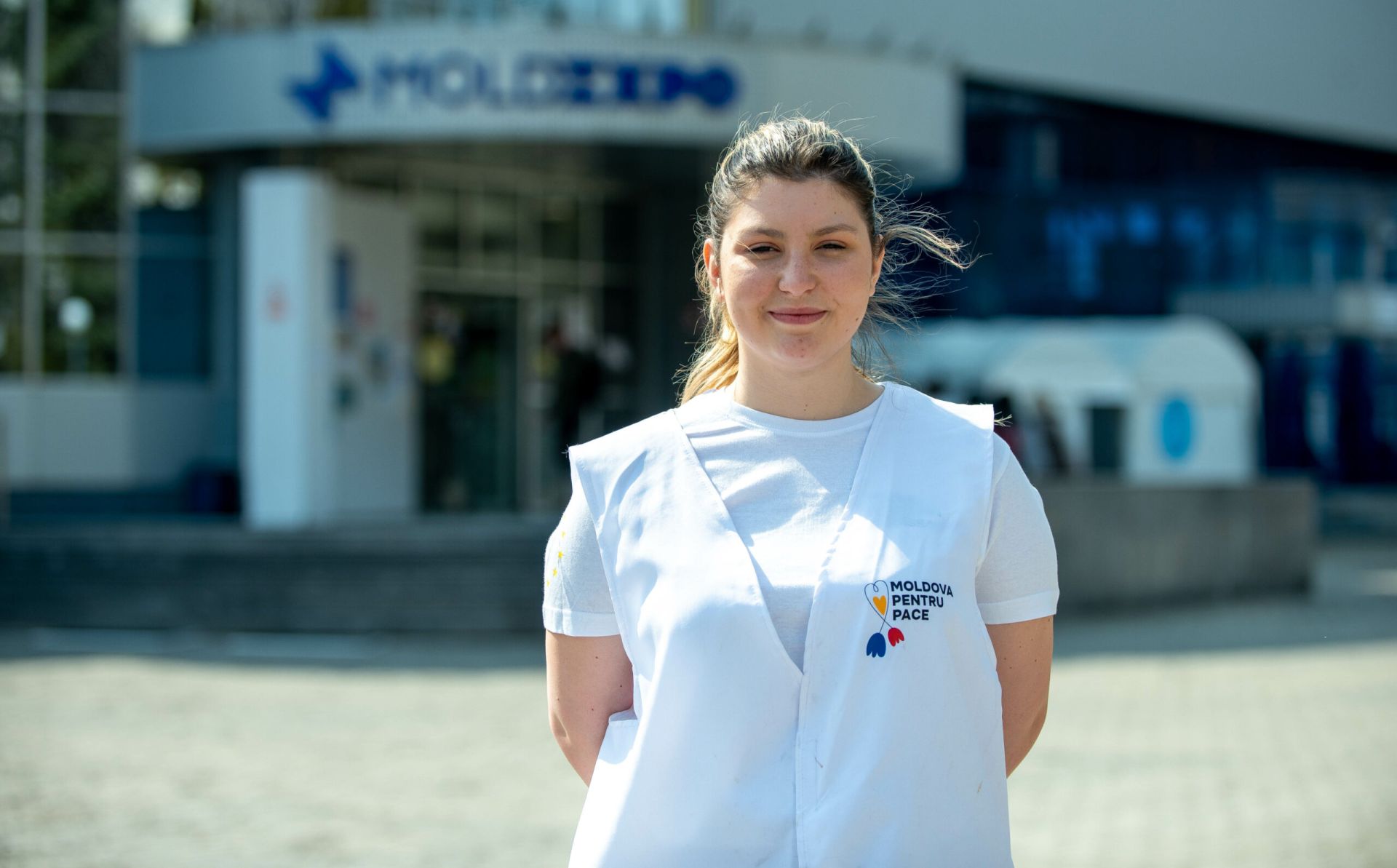
The country that has become my second home: how Moldova is helping Ukrainian refugees
Since the beginning of the war in Ukraine, more than 375,000 refugees have arrived in the Republic of Moldova. Some continued their journey to other European countries, while some chose to stay in Moldova, waiting for the day when they could return home. Among them is 29-year-old Kateryna from Odesa. She arrived in Moldova at the beginning of March and met the family who gave her a home away from home, providing her with shelter for as long as necessary.
Kateryna is a programmer. When the war broke out, she planned to go to a safer country with her friends, but those plans were turned upside down. It so happened that her whole family stayed in Ukraine, and in the end Kateryna stayed in Moldova alone.
“I’ve been planning to leave since the beginning of the war. On the first day, when there were the first explosions, people didn’t know what to do. I couldn’t get ready, I understood that the only way out was to go somewhere, start working, helping. My mother called me and said that my aunt would be leaving for Moldova early next morning. I said I was going too. That’s how I left,” says Kateryna.
Most of Kateryna’s friends and acquaintances who left Ukraine did not stay in Moldova. But Kateryna decided to stay, although her friends tried to persuade her to go to another country. The first reason was an expired passport. But this was not an obstacle to entering and staying in Moldova, as the authorities issued a law allowing Ukrainians to enter the country with an identity card. After a while, Kateryna realised that she felt safe here. Moreover, Chișinău felt very familiar and similar to Odesa.
“Even now, walking along the streets, they feel familiar to me. A lot of things remind me of home. There are a lot of similar places, even in the architecture.”
From her previous life, Kateryna only has her job left. Otherwise, everything is new: the house she lives in, the people around her. However, Kateryna says she feels good here and is very grateful to Moldovans for the attitude and assistance they provide to Ukrainians.
“I am so surprised about people – in a good sense of the word. I couldn’t image the people here could be so kind and hospitable. I was so confused in the first two weeks. I asked myself, could this really happen? They help and drive you for free, give you SIM cards, provide food and housing to those in need. It seemed to me that this was some kind of utopia. That it couldn’t happen this way. I think I’ll never tire of repeating how grateful I am. That was probably one of the reasons why I stayed and didn’t go any further. I didn’t plan to come to Moldova, and then it turned out that this country has become a second home for me.”
Kateryna’s second family
Kateryna had never been to Moldova before. An old acquaintance helped her with the information, and as soon as she arrived at customs, three cars were found for her, which were ready to bring her to Chișinău for free. On the way to the capital, she learned that there was a family that would shelter her.
Now Kateryna lives with Valeria, an 18-year-old girl who decided to help refugees from Ukraine, together with her family.
“On the second day of the war, my father said that he had a request for me. He asked if I would like to take in one or more refugees, since I live alone in an apartment and I have a spare room. And, of course, I agreed,” says Valeria.
Valeria insists that her family’s desire to help refugees is nothing more than basic human values that everyone should have.
“We wanted to show solidarity with people from there, we don’t know when we could be in their place. We say that our country is poor, but in general we are hospitable and want to help those who do not have an opportunity or who are in crisis. The good comes back anyway.”
First, they went to the Moldexpo refugee accommodation centre in Chișinău. There, they met a mother with two children, who were taken into their home for three days. Later, the family moved to Germany. After that, through Facebook groups, Valeria’s father found Kateryna.
“We became good friends. We have common interests, we share our stories from school, from childhood. We discuss various social and political issues,” says Valeria.
For Kateryna, Valeria and her parents became a second family.
“I always told my parents that I wanted a brother or sister. I grew up as an only child in the family. It seems to me that now I have a younger sister. I am very grateful to Valeria and her family for sheltering me. Now, they have become my second family. Last week we went to the countryside to visit Valeria’s grandmother. It was very homey. I said I felt awkward, I’m a stranger. But Valeria said that I was no longer a stranger to them.”
Kateryna is interested in Moldovan culture. She learned about the history of Mărțișor (the traditional bracelets given at the beginning of Spring), when she received a piece of jewellery as a gift, and is trying to learn Romanian words with Valeria. The future is uncertain for her, but she hopes that everything will get better, and that she will be able to return home as soon as possible.
“I don’t even know what will happen tomorrow. It’s difficult to plan, but I really want to go home, I miss everyone very much. I want to hug and kiss my cat.”
Help and solidarity through volunteering
The assistance and solidarity of Moldovans during this period took different forms. While some people hosted refugees at home, others donated food, clothing or money. Some Moldovans, especially young people, decided to become volunteers.
Teodora is in the 12th grade at school. Now 18, she started volunteering since she was 13. Teodora has been a Young European Ambassador since the summer 2020 and she promotes European values. She participated in various volunteer activities, from education to climate change, and with the outbreak of war in a neighbouring country, she focused her activities on volunteer assistance to refugees.
“For me, in fact, the war began with my coming of age, because the war began on 24 February, and on 25 February I turned 18. My first thought was to write to my Ukrainian friends. Because last September I was in Kyiv within an Erasmus+ project and made a lot of friends there. My heart was breaking when I wrote to them. They said they were hiding while their fathers were fighting. It hurts, and I tried to help them in any way I could.”
From the very beginning of the war, Teodora came to the Moldexpo refugee accommodation centre and became a volunteer. Since then, she has worked as a volunteer in several locations in Chișinău with her main activity being focused on warehouses.
“I started working as a volunteer in a warehouse. Here we sort people’s donations. In the early days, there was a huge amount of work. I remember coming home in the evening and my muscles were aching. The next day I could barely walk. When I tried to volunteer with refugees, it was more difficult for me, although I eventually adapted. It was difficult for me because I could feel pain in their eyes. It’s hard when an old lady comes up to you with tears and says ‘thank you’, or when you see how people are fleeing from the war, leaving everything there. People are stressed, and it’s difficult because you don’t know what to tell them”, says Teodora.
In addition to working as a volunteer in centres for refugees, Teodora keeps in touch with many people by phone or via the Internet. She tries to help them with information about work, transport, housing, school admission, Romanian language courses.
“By the way, many Ukrainians have asked me where one can learn Romanian. One woman even asked me to speak to her and her daughter in Romanian because they want to learn the language.”
Teodora admits that the first two weeks were the most difficult, as she came right after classes to Moldexpo and stayed there until late. However, over time, a more stable schedule was established, which allows her to cope with all types of activities without overdoing it.
“I didn’t force myself, because there were volunteers who spent the night in refugee centres in the first days, got tired and then didn’t come. It is important to calculate your forces. Even if we have a strong desire to help, it is important that we do not suffer either,” explains Teodora.
During this period, Moldovans managed to mobilise strongly, everyone tried to help in any way they could. “Working as a volunteer for refugees, I didn’t feel that I was doing something out of the ordinary. This is normal,” Teodora said.
Moldova also needs help
Since the beginning of the war, almost all communities, national and international organisations have been actively involved in helping refugees. An example of this are the Young European Ambassadors who try to support their neighbours in every possible way.
“The promotion of peace, human rights, freedom, the rule of justice, democracy, solidarity are some of the core values and goals that guide the European Union and the Young European Ambassadors Initiative in Moldova. Russia’s war against Ukraine is diametrically opposed to these values and seeing how the fundamental rights of the people of Ukraine are being violated, we understand that we must act, show solidarity with the Ukrainian people and help those who find themselves in a difficult situation because of the war. I think that peace, joint efforts and cooperation are necessary for progress in our societies, because together we are stronger!” says Daniel Bîzdîga, coordinator of the Young European Ambassadors Initiative in Moldova.
The help ranged from online messages of support and dissemination of information about what is happening in Ukraine to concrete help: volunteering in refugee centres (meeting points, information assistance, etc.), donating essential goods (food, children and hygiene products) and sending humanitarian supplies to Ukraine.
It is no secret that Moldova is much poorer than other European countries, and the wave of refugees from Ukraine has an impact. In addition to human solidarity, the country also needs financial means. Moldova receives this economic and material support from the EU.
“The impact on the Republic of Moldova has been severe in many ways,” explains Jānis Mažeiks, Head of the EU Delegation to the Republic of Moldova. “First of all, we are talking about the direct impact, namely the flow of refugees. Of course, it is important for the international community to support the Republic of Moldova in the crisis, and also in the long term. The European Union has provided significant support through the Civil protection mechanism. A total of 17 EU member states have provided assistance to the Republic of Moldova amounting to €14 million, and this support continues. Almost every day we are informed about the delivery of new aid,” says Ambassador Mažeiks.
The EU assistance is not only about providing people with material things, but also about providing human resources as well.
“We have an agreement with Frontex, the EU border management agency, which has already sent its teams to Moldova to help Moldovan border guards receive refugees. There is also a European Union Border Assistance Mission to Moldova and Ukraine. Officers of this mission are also at the border and offer assistance to refugees,” added Jānis Mažeiks.
The EU Ambassador to Moldova assures that the country will continue to receive support.
“We are also thinking about the long term because it is not just about the current refugee crisis. We are thinking about how we can help Moldova in a timely way to support sustainable development and the economy,” concludes the Head of the EU Delegation to the Republic of Moldova.
Author: Elena Baranov
MOST READ
SEE ALSO

‘The Kremlin has entered the chat’: how to protect your personal data on Telegram and avoid the bait of propaganda

No, time is not on Russia‘s side
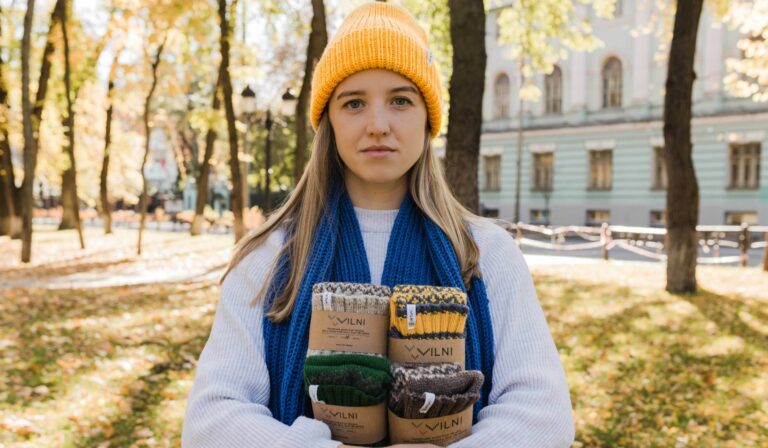
Socks for Peace: how the Vilni project is supporting internally displaced women in Ukraine
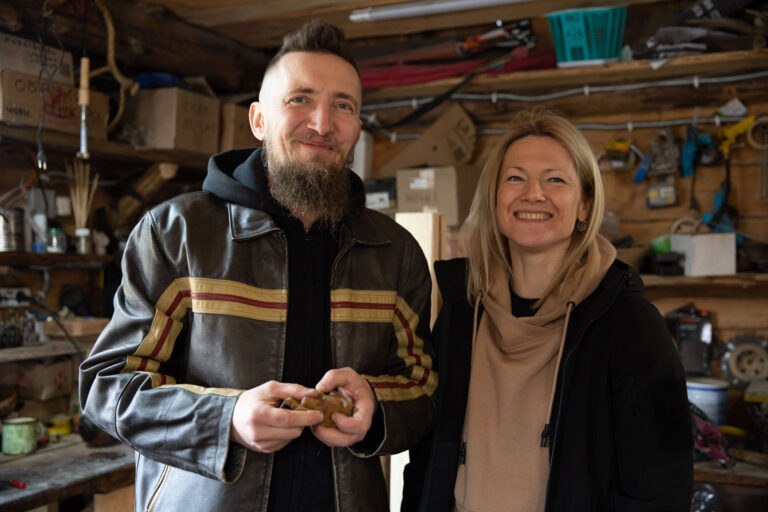
Celebrating traditional Ukrainian cultural identity in Rivne

How to open an art business in Moldova: the experience of Alexandra Mihalaș
More campaign pages:
Interested in the latest news and opportunities?
This website is managed by the EU-funded Regional Communication Programme for the Eastern Neighbourhood ('EU NEIGHBOURS east’), which complements and supports the communication of the Delegations of the European Union in the Eastern partner countries, and works under the guidance of the European Commission’s Directorate-General for Neighbourhood Policy and Enlargement Negotiations, and the European External Action Service. EU NEIGHBOURS east is implemented by a GOPA PACE-led consortium. It is part of the larger Neighbourhood Communication Programme (2020-2024) for the EU's Eastern and Southern Neighbourhood, which also includes 'EU NEIGHBOURS south’ project that runs the EU Neighbours portal.

The information on this site is subject to a Disclaimer and Protection of personal data. © European Union,
